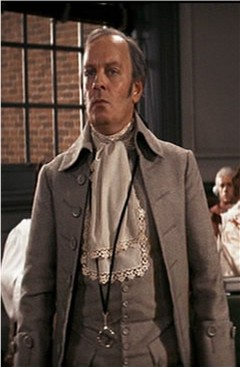|

James Wilson… First of all, the whole issue with Wilson being in Dickinson’s shadow and why he finally moved out of it in the final
vote is best explained by Peter Stone and Sherman Edwards and their conjecture:
"The
conversion of James Wilson… from the “Yea” to the “Nay” column at the last minute is an event
without any surviving explanation. All that is definitely known is that Wilson, a former law student of Dickinson’s
and certainly under Dickinson’s influence in Congress, as his previous voting record testifies, suddenly changed his
position on independence and, as a result, is generally credited with casting the vote that decided this issue. But why? A
logical solution to this mystery was found when we imagined one fear that he might have possessed that would have been stronger
than his fear of Dickinson’s wrath - the fear of going down in history as the man who single-handedly prevented American
independence. Such a position would have been totally consistent with his well-known penchant for caution."[1]
There is definitely
an echo of Dickinson in Wilson’s
words in the movie. “Why begin, till we know that we can win, and if we cannot win, why bother to begin?” can
easily be translated into Wilson’s words to John Adams: “You must see that we need time - time to make certain
who we are and where we stand in regard to one another - for if we do not determine the nature of the beast before we set
it free, it will end by consuming us all.” Dickinson and Wilson both seem to be seeking certainty in uncertain times.
Wilson is treated rather shabbily by Dickinson throughout the movie,
especially when Dickinson interrupts him. How rude! “Well
I think…”
It is kind of bizarre to think that a grown man such as Wilson
doesn’t think for himself. Now I can understand basing decisions on precedent, but it seems to me Wilson is doing a bit too much blind following. I am not really trying to make fun of Wilson or anything, but he really isn’t his own man in the movie.
He seems too beholden to Dickinson, and in Wilson’s eyes,
Dickinson’s opinion is always right.
Except for towards the
end when Wilson moves away from Dickinson
to avoid “being remembered” (Oops! Disregard this site, Mr. Wilson!) and thus saves himself from being labeled
that man who prevented American independence.
I don’t know, what do you think? Is it just Wilson
has no backbone? Is he genuinely afraid of being remembered by history? If yes, then is it because he didn’t think he
was worth remembering because he might make mistakes? Is that the responsibility he spoke of - being perfect for posterity?
Of having his every move analyzed and questioned… (Oops again! Sorry, Mr. Wilson!)
For all the making fun of that is done, James Wilson is an important
historical figure. He studied law - as stated above - and was, as the movie says, a judge. According the American National Biography, Wilson
was quite talented as a lawyer and firmly behind the idea that power was derived from the people and since the colonies were
not represented in Parliament, Parliament had no power over them. “However, Wilson resisted the colonies’ push
towards independence because he feared that it would undermine Pennsylvania’s balanced government."[2] Whether
this or Edwards and Stone’s explanation is accurate, both come back to what I suggested above: Wilson was seeking stability
in uncertain times.
-----------------------------------------
[1] Peter Stone and Sherman Edwards, 1776. (New
York: Penguin Putnam Inc., 1970), p. 166.
[2] John
K. Alexander, “James Wilson,” American National Biography Online February 2000. http://www.anb.org/articles/02/02-00340.html (Accessed October 2, 2008).
|



